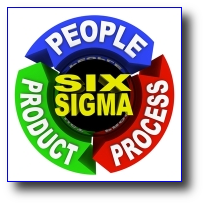The Succesful CEO's Best Kept Secret

As Dr. W.E. Deming had commented "... 85% of the reasons for failure to meet customer expectations are related to deficiencies in systems and processes rather than the employees. The role of management is to change the process rather than badgering individuals to do better."
Business efficiency,
customer satisfaction and loyalty
Six Sigma is a disciplined process that helps a business to focus on developing and delivering greater efficiency and near-perfect products and services. The ultimate aim of Six Sigma is a high level of customer satisfaction and retention.
Customers value the results of consistent, predictable business processes that deliver best-in-class levels of quality and value for their money. What they feel are in fact the results of variances in product quality delivered, or service performed, not the averages.
Delivering best-in-class products & services
Six Sigma is a mindset of removing waste and variance, not just a quality programme — it's not another management cliché. It sounds a bit involved and complicated, but it isn't.
Six Sigma can be seen as a strategy for creating additional value for a firm's customers and employees alike and providing ROI predictability for shareholders.
The term "sigma" actually refers to a statistical concept — the capability or performance of a process as it relates to what the customer requires.
Strategy for added value
Six Sigma means that if you can measure how many "defects" you have in a process, you can systematically figure out how to eliminate them and get as close to zero as possible. In fact a Six-Sigma process will produce only 3.4 defects for every one million. Perfect process !
Often, a firm's "inside-out" view of its business is based on average or mean-based (most occurring) measures of its recent past. Customers don't make judgements on averages — they feel the variance in each transaction, each product delivered or each service performed.
So, first focus is on reducing process variation and then on improving the process capability — critical contributors to customer satisfaction, retention and loyalty. Customers value consistent, predictable business processes that deliver best-in-class levels of quality and value for money — that is what Six Sigma strives to produce.
Customer defined
product and service quality
When we refer to the term "quality" we define it in this context in relation to a customer's requirements for our products and services (1). Quality needs to be viewed externally or "outside-in", from the customer's perspective and is the measurable outcome. The goal is to achieve complete customer satisfaction and the customer is always the ultimate judge.
It ties in with Philip Kotler's words, the renowned marketing specialist: "Marketing is not the art of finding clever ways to dispose of what you make. Marketing is the art of creating genuine customer value. It is the art of helping your customer become better off. The marketer's watchwords are quality, service and value."
Even though today's highly competitive environment leaves most firms little or no room for error, it is interesting to note that many businesses find that their processes only perform at a 3 sigma level or lower. They never realised this, until they started to measure their degree of customer satisfaction.
Best-in-class service standards
Six Sigma can help any firm's drive to achieve improved or best-in-class service standards and so help set it apart from its competitors. Six Sigma provides the mindset, management system and tools to accomplish these goals.
Implemented correctly, companies have seen a significant upsurge of their investment of time, people and money. Businesses can take advantage of Six Sigma skills without incurring huge expense.
By taking a focused and systematic "piece-meal" approach it is possible to make real gains to the top and bottom lines of any business — rapidly !
Thousands of companies around the world have discovered the far reaching benefits of Six Sigma - shouldn't you be one of them?
(1) The customer can be internal or external to the business.
Additional information on Customer Relationship Marketing management >>
Please call us for a no obligation exploratory discussion
Business Development | Marketing | Management Consultants
Business Predictability
Six Sigma efficiency covers the entirety of service-related activities, enabling longterm future stability for a business ...
read more ...
Brand Credibility Basics
The critical marketing factors relating to brand prosperity or decline ...
read more ...
Marketing Budget and ROI
We can help any size company implement an effective marketing oriented culture of professional standard that is right for the business, customers and the budget ...
read more...
Business Planning Services
Many business plans are written to secure funding but ours do much more ...
read more ...
Preparing for Investor Funding
Raising venture finance is not just about writing a good business plan ...
read more ...
The 22 Laws of Marketing
Outsourced Business Development and Marketing
Entering a new market or having trouble with an existing one? Let us help to open up your sales and marketing activities ...
read more ...
Strategic Alliances
With executive networking services, some real problems our partners helped to resolve ...
read more ...
Business Growth Services
Business Development Services for new channels, contacts and taking your company to the next level ...
read more ...
Governance & Compliance
As a company grows, and its operations become more complex, corporate governance and management systems become increasingly important ...
read more ...



